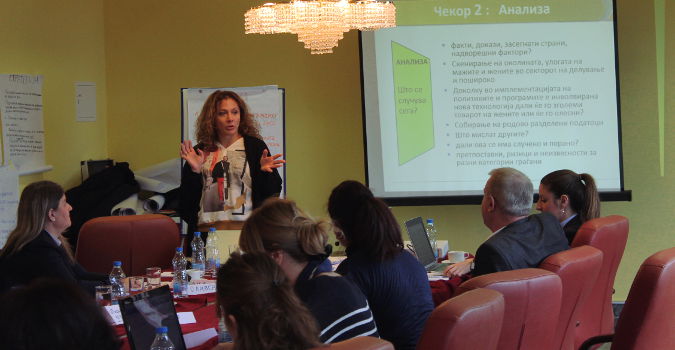Leadership and Political Participation

Despite their proven leadership abilities and right to participate equally in democratic governance, women’s participation in decision making remains limited in North Macedonia. Gender gaps and inequalities continue across all levels.
North Macedonia is one of only six countries worldwide whose gender gap has grown since 2005, according to the World Economic Forum’s 2014 Gender Gap Report. Women make up only 39.5 per cent of the employed, earn 17.9 per cent less than men per hour of work, and are 64.2 per cent of the country’s economically inactive population.[1]
Any progress in government or politics, such as increased representation of women in the National Parliament and municipal councils, is due to electoral quotas. In executive bodies, where quotas don’t exist, women’s representation is low: Women hold only 10 per cent of ministerial posts and 4 per cent of mayoral posts.
Since it opened in 2006, the UN Women programme office has worked to unlock progress for women’s leadership and political participation. It does this by providing expert support to government and civil society efforts to:
-
strengthen women’s leadership;
-
increase the number of elected women politicians, particularly at the local level;
-
and fulfill North Macedonia’s national and international gender equality commitments and enact laws and strategies to meet its obligations deriving from these commitments.
The key international commitments made to women by the government of North Macedonia are:
-
the Convention on the Elimination of All Forms of Discrimination against Women (CEDAW), ratified in 1994 and which uphold women’s right to participate in public life;
-
the Council of Europe Convention on preventing and combating violence against women (Istanbul Convention, signed in 2011 but not yet ratified); and
-
the Beijing Platform for Action, which calls for removing all barriers to equal participation.
In addition, North Macedonia has adopted several laws and established mechanisms to advance gender equality. The Law on Equal Opportunities of Women and Men obliges public institutions to ensure equal rights and opportunities for women and men and to integrate gender into their policies, strategies and budgets through specific measures to reduce gender inequality.
The country is implementing its first National Strategy on Gender Equality (2013-2020), a Government Strategy for introducing Gender Responsive Budgeting (2012-2017) and a second National Strategy for protection and prevention of Domestic Violence (2012-2015).
National gender policies are implemented by the Department for Equal Opportunities of Women and Men at the Ministry of Labour and Social Policy, the Parliamentary Commission for Equal Opportunities, coordinators for equal opportunities in all line Ministries and by a government inter-sectorial gender equality advisory group. There are also equal opportunity commissions and coordinators at each local self-government unit.
Despite these efforts, implementing gender equality at the local level has been difficult.
Elected women councillors have weak influence within their political parties and local self-government units and there were no female mayors anywhere in the country from 2009 to 2013.
To address women’s low representation and weak political influence at the local level, UN Women launched the three-year project ‘We are leaders of our communities’. Implemented by the Institute for Social Sciences and Humanities ‘Euro Balkan’ and the Macedonian Women’s Lobby, the project:
-
supported women candidates in the 2013 local elections;
-
strengthens elected women’s capacities in their local government units and parties;
-
works to improve local gender equality policies to better reflect local citizens’ needs and priorities.
UN Women in action in North Macedonia
-
47 newly elected local councillors and Equal Opportunities Commission members in 21 Local Self-Government Units (LSGUs) completed a one-year mentorship programme that included online courses and direct mentorship to design and implement local gender equality actions
-
LSGU councillors introduced gender equality initiatives and allocated municipal budget funds for local citizens’ specific needs initiatives with a direct impact on women’s lives:
-
The Municipality of Stip introduced extended kindergarten hours to benefit families doing shift work in local textile factories;
-
The Municipalities of Sveti Nikole and Mavrovo-Rostushe supported awareness-raising activities and free transportation for women from rural communities so that they can obtain regular preventive breast and uterine cancer check-ups;
-
the Municipality of Ceshinovo Obleshevo hired a lawyer to provide free legal aid to survivors of domestic violence;
-
The Municipality of Strumica amended its statute and internal human resource management procedures to strengthen the mandate and responsibilities of its Commission for Equal Opportunities;
-
The Municipality of Bitola introduced a new bus line in rural communities to better serve rural women.
Notes
[1] Labour Force Survey, State Statistical Office of FYR Macedonia, Skopje, 2014